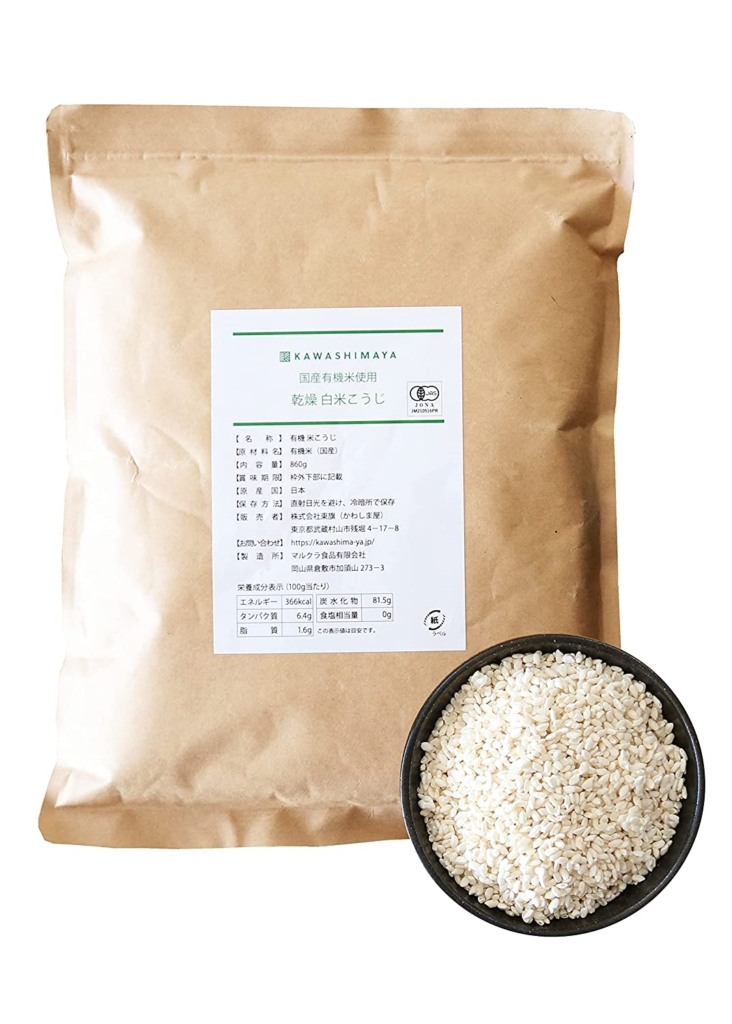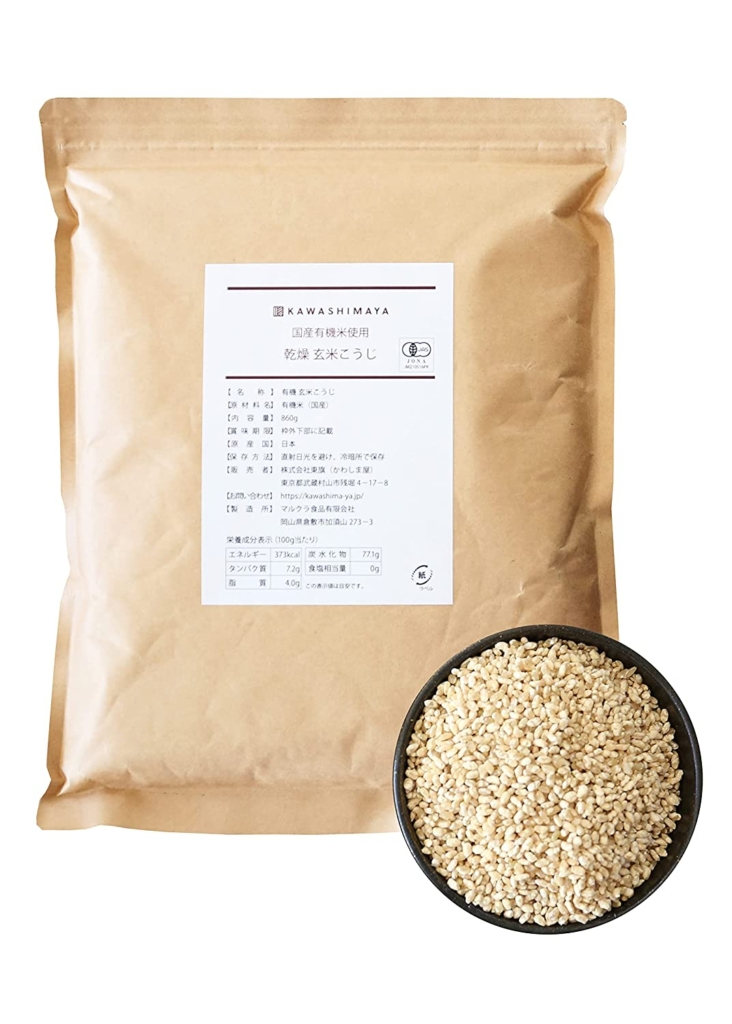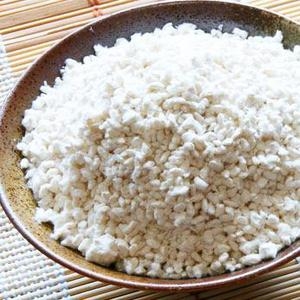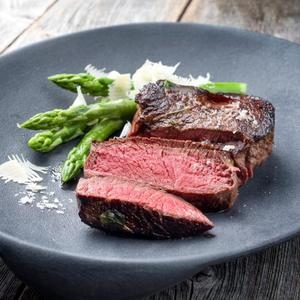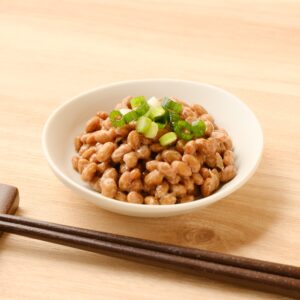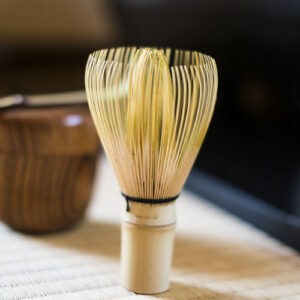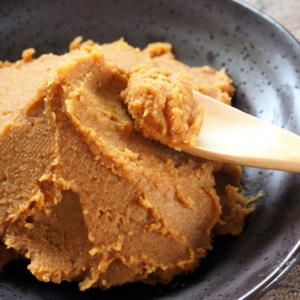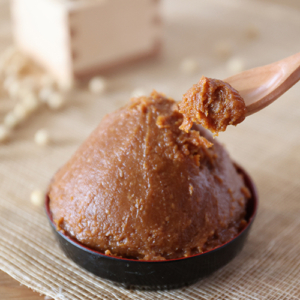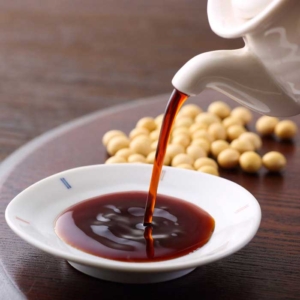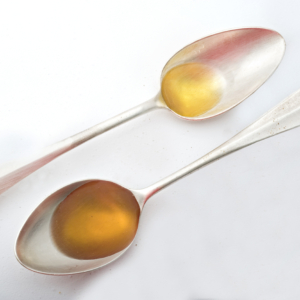What is Dried Koji?
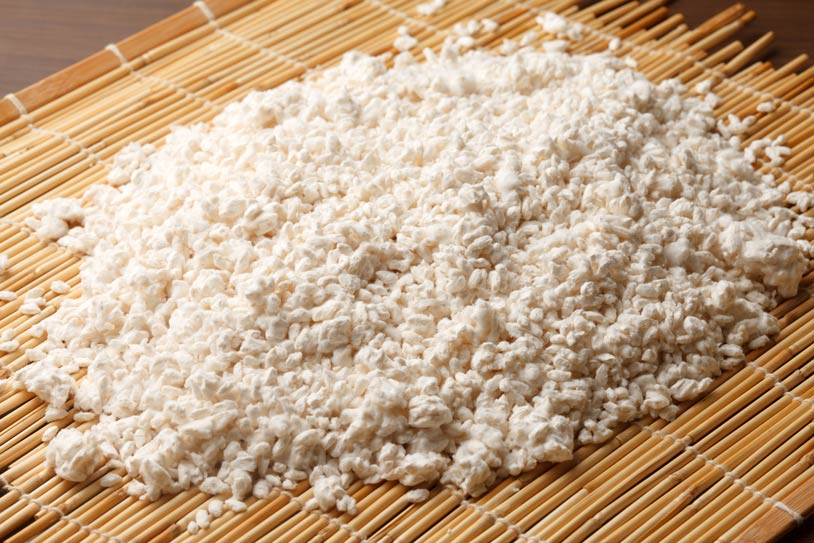
Koji in general, is a starter indispensable to Japanese cooking. It was first mentioned at the beginning of the 8th century for sake-making. They are steamed grains left to ferment until mould grows on them, subsequently breaking down to produce glutamate (umami). It is widely used for making miso, shio koji, amazake, for fermentation and more.
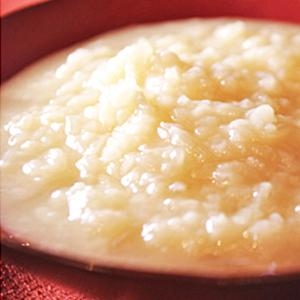
This leads us to our star ingredient of the day–dried koji!
Dried koji, like the name suggests, is a type of koji that has been dehydrated. The varieties of koji are distinct across Asian countries because of the propagation properties. For example, koji in Japan propagated on rice whereas in China, it was propagated on grains.
The two common divisions of Koji are regular koji (raw koji) and dried koji, which differs based on moisture content. Dried Koji has approximately 10% or below moisture content while raw koji has a higher water constitution at 25%. Thus, regular koji that is not dried is susceptible to various bacterias. The quality deteriorates easily due to self-fermentation. Since regular koji is harder to store, dried koji plays a great substitution role. Learn about their differences.
In other words, dried koji prevents self-fermentation by standing against bacterias. Besides that, dried koji has a similar taste to that of regular koji. The sweet and floral scent of dried koji is popular not only amongst chefs but also households as it can be rehydrated with water according to the amount intended for use. For instance, the making of amazake, miso, marinades, or koji rice in small amounts at home.
Recommended Dried Rice Koji Products
How to Use Dried Koji

As mentioned above, dried koji is regular koji that has been stripped of its water content. The hint of sweetness delivered in koji is expressed by the enzyme that decomposes starch.
Dried koji can be used to make miso by mixing it with soybeans; to make shio koji or salt koji as an ingredient for marinades and soup stock; to make sake, pickles and soy sauce.
Besides that, dried koji can be used as a substitution for yeast in baking goods. This ingredient would also serve the needs of vegan or vegetarians as well as people with sweet-tooth, where dried koji is used in the process of making desserts such as puddings and smoothies.
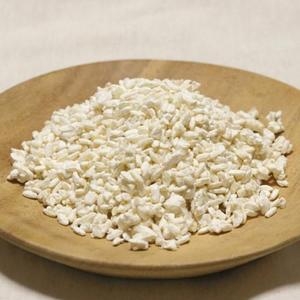
How to Rehydrate Dried Rice Koji
This tutorial by Kawashima The Japan Store shows how to rehydrate dried koji in your kitchen, by taking advices from dried koji manufacturer themselves.
What to prepare
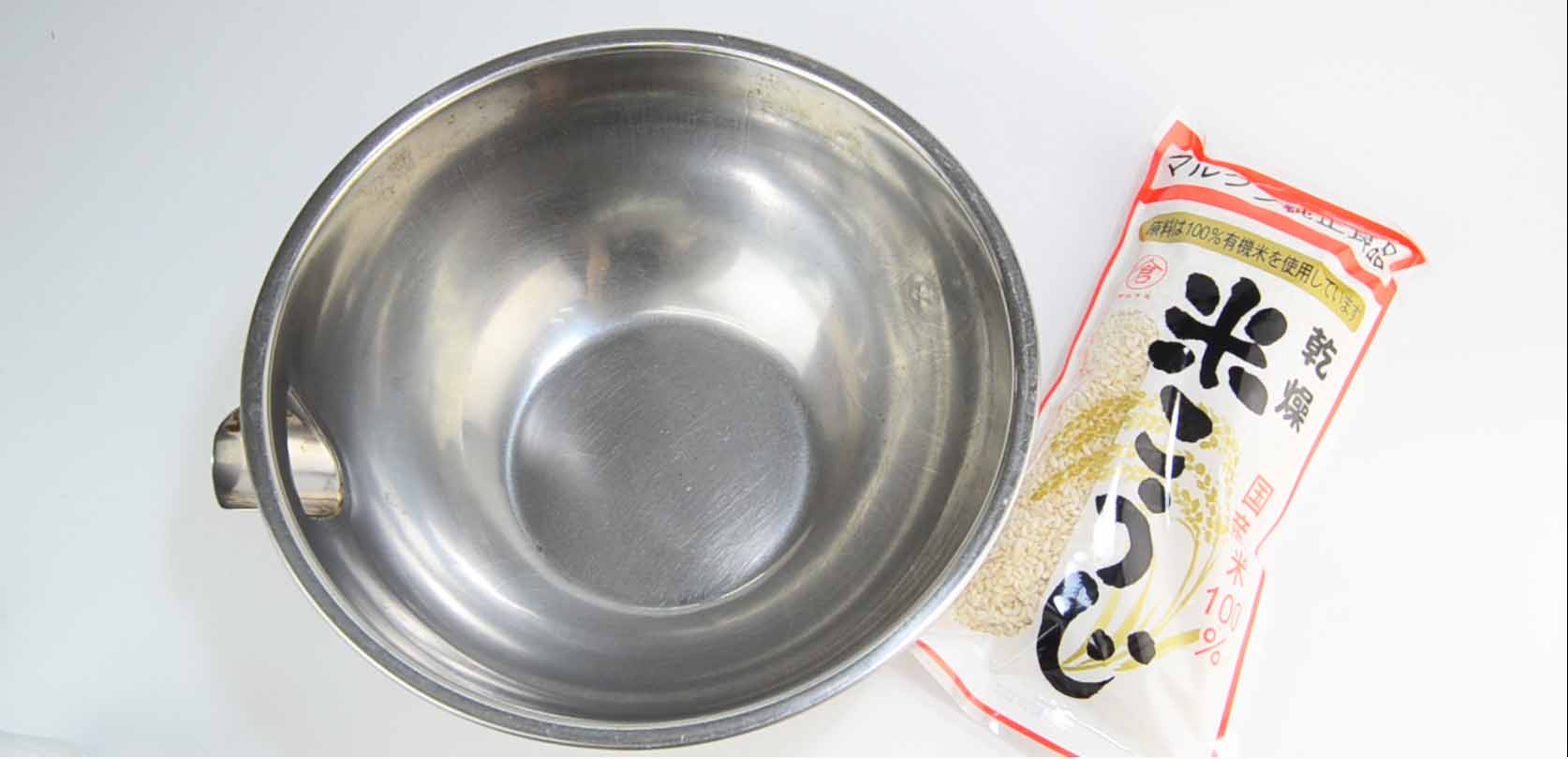
• Dried Koji (500g)
• Big Bowl or Tray
Tips: To prevent the growth of unwanted microorganisms, thoroughly wash your hands and equipment. We recommend disinfecting the equipment by boiling them in hot water.
Process of Rehydrating Dried Koji
- 1
- Put dried koji into the bowl.
- 2
- Add lukewarm water, then mix them together.
- 3
- Let the mixture sit for a while.
- 4
- Your koji is ready to use!
#1 Put dried koji into your bowl
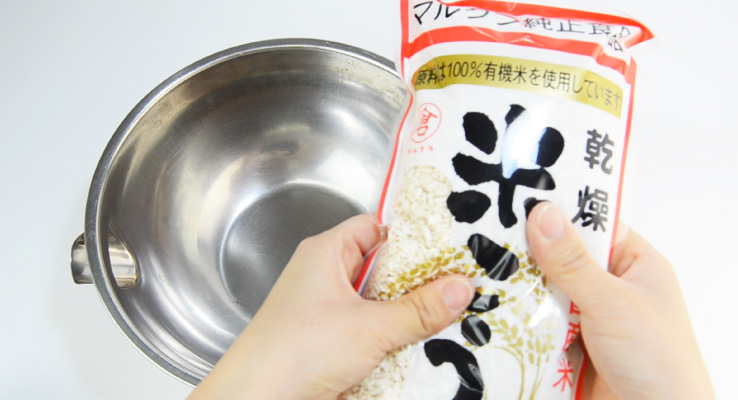
Before putting the dried koji into the bowl, gently loosen the koji by pressing the bag with your fingers.
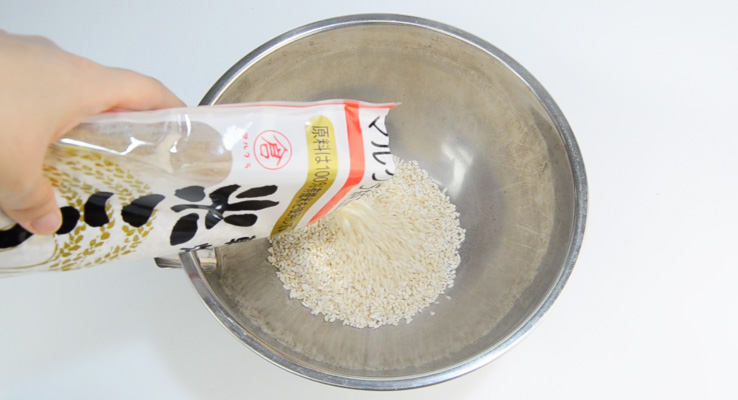
After that, put 500gr of dried koji into your bowl
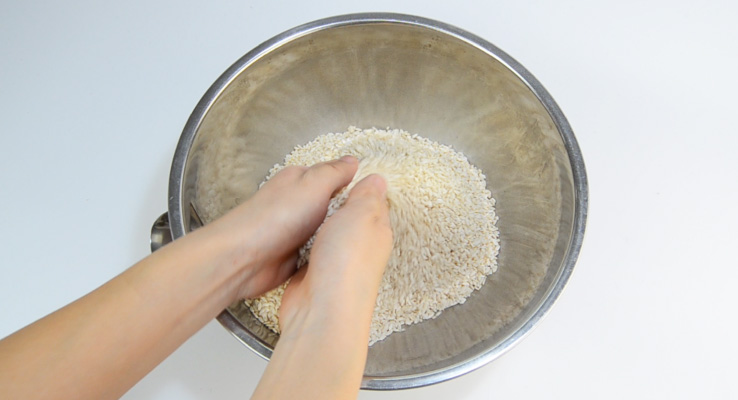
Make sure the dried koji rice doesn’t stick together. You can use your hands to separate the grains.
#2 Add lukewarm water, then mix it
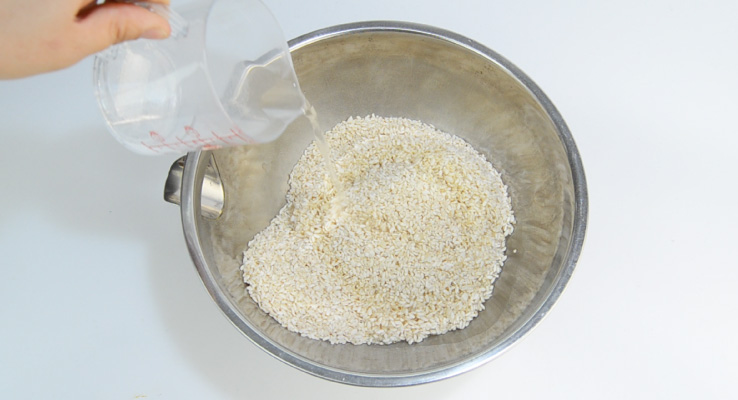
Add about 200cc of lukewarm water into your bowl. The ideal water temperature is about 50 to 60℃. The warmth makes koji plump and nice.
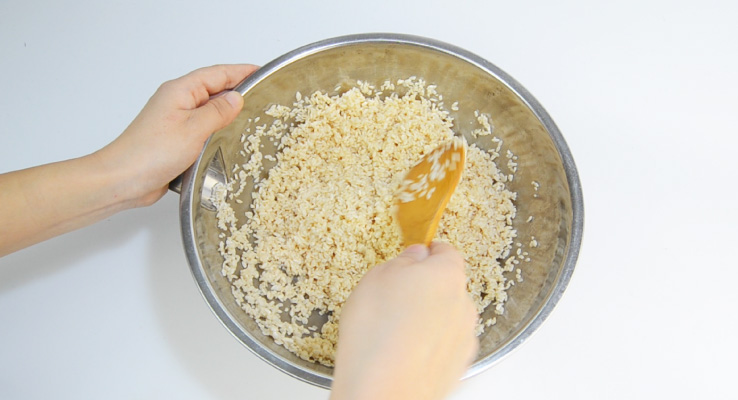
Mix them well until all the dried koji is covered in water.
#3 Let the mixture sit for a while
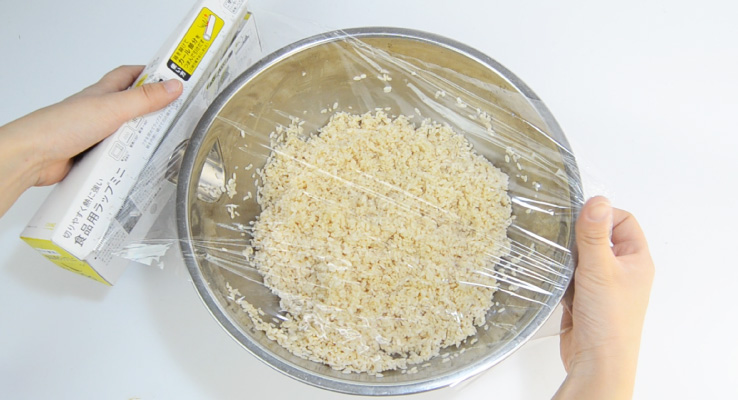
Cover the bowl with wrapping plastic and let it sit for about 1-2 hours. You should stir the mixture after 10 to 15 minutes, then let them rest again.
#4 Koji is ready to use
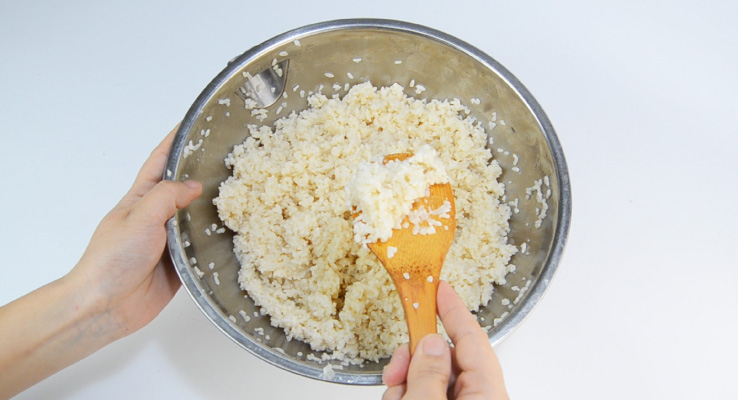
Dried koji is rehydrated.
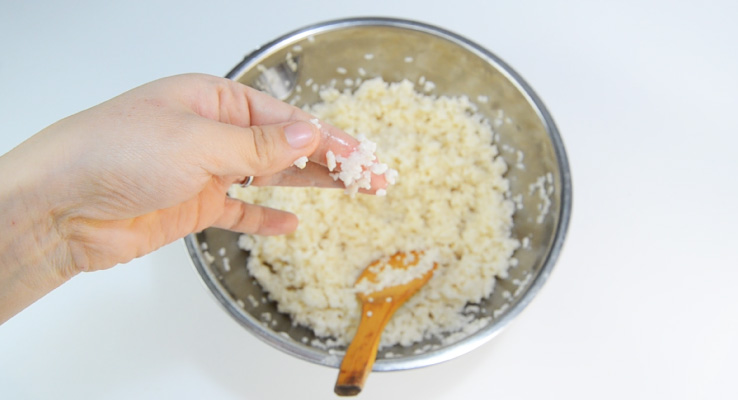
If you can crush the koji with your fingers, that means it is ready to use!
Important Points when Rehydrating Koji
• Do not use boiling water. The ideal temperature is between 50 to 60ºC.
• Please use the rehydrated koji in the same day.
• Use them as soon as possible after opening the package.
• Do not use expired dried koji, the fermentation culture is already weakened if it passed the expiration date.
• Keep dried koji in a cool and dark place. Do not expose under direct sunlight.
How to Store Dried Koji
When storing dried koji, avoid places with high humidity. The humidity will cause significant changes in koji taste and quality.
Avoid exposing koji under direct sunlight. Store them in a cool and dark place such as the refrigerator.
Useful Tip:
Please do not store it in the freezer because the fungus could weaken if frozen.
Be sure to follow through this storing instruction to preserve the natural taste and quality of dried koji. Please enjoy dried koji in its best condition!
Differences between Dried Koji and Raw Koji

| Regular Koji | Dried Koji | |
| 25% | Moisture Percentage | Under 10% |
| 2 Weeks (Refrigerated) | Best Before | 1 Year (Room Temperature) |
| Similar | Enzyme Power | Similar |
| Soft | Physical Texture | Hard |
Regular Koji
Advantages:
Fresh koji has the capability of turning starch into glucose.
It can be used to make high quality fermentation food that produce various enzymes and nutrients.
Disadvantages:
Prone to unwanted bacteria due to high moisture.
Quality can change because of self-fermentation.
It is hard to store.
Dried Koji
Advantages:
Dried koji is not prone to unwanted bacteria.
Storage is easier as dried koji will not self-ferment.
It is easily available at the supermarket.
Disadvantages:
If dried koji is added with hot water, the nutrients and enzymes that are kept in koji may be damaged.
It needs the correct water temperature before use.
The amount of nutrients and the enzymes damaged in dried koji depends on the kinds of rice and koji starter used. The environment where koji is made and stored may also affect them. Nevertheless, the nutrients and enzymes in koji will remain as long as they are handled correctly. When using dried koji, please be mindful of the water temperature.
Besides, the water amount and soaking time may differ from one brand to another. We recommend reading the explanation on the back of the packaging for more accurate measurements. Ultimately, don’t be limited by these restrictions and feel free to experiment rehydrating dried koji according to personal preferences.
Dried Koji FAQ
- What is Dried Koji?
- Dried Koji is koji that has been dried by removing the water content of raw koji (fresh koji).
- How do you use dried koji?
- Dried koji can be used to make shio koji (salt koji), homemade miso, amazake, yeast substitution for baking, desserts and more! Find out more.
- How do you rehydrate dried koji?
- You will need a bowl and lukewarm water for this. Put dried koji into the bowl and add lukewarm water. After mixing them together, let it sit for a while. Your koji is now ready to use!
- Is dried koji safe for consumption?
- Yes! Dried koji is a common ingredient in many households in Japan and widely used by chefs globally. The enzyme in koji breaks down to form natural sweetness, a perk for health enthusiasts!
- What’s the difference between regular koji and dried koji?
- The moisture content and self-fermentation. Regular koji has slightly more water content and therefore is susceptible to bacterias during self-fermentation. Dried koji on the other hand, traps the nutrients and enzymes to ensure quality is not compromised. Read more here.
- How do you store dried koji?
- Avoid places with high humidity and exposing koji under direct sunlight. Store them in a cool and dark place such as the refrigerator to preserve the natural taste and quality of dried koji.
Recommended Dried Koji Products
Also Available On Amazon USA
Dried Koji, Malted Rice from Organic White Rice, Meat Tenderizer Umami Seasoning 860g (30.3oz) – Made in Japan, for Miso, Amazake Sweet Sake, Pickles, by Kawashimaya
Handmade dried koji made by craftsmen using only JAS Organic certified white rice from Okayama Prefecture, Japan. Produced and dried naturally without additives to preserve the original aroma and flavor of the koji. Taste the subtle sweetness and balance umami from rice koji.
Dried Koji, Malted Rice from Organic Brown Rice, Meat Tenderizer Umami Seasoning 860g (30.3oz) – Made in Japan, for Miso, Amazake Sweet Sake, Pickles, by Kawashimaya
Handmade dried koji made by craftsmen using only JAS Organic certified brown rice from Okayama Prefecture, Japan. Produced and dried naturally without additives to preserve the original aroma and flavor of the koji. Brown Rice (Genmai) Koji has an earthy, refreshing taste with natural sweetness and umami from koji. Please use this dried koji with great enzyme power, not prone to unwanted bacteria, is very easy to use, and has a long shelf life.


 Content List
Content List